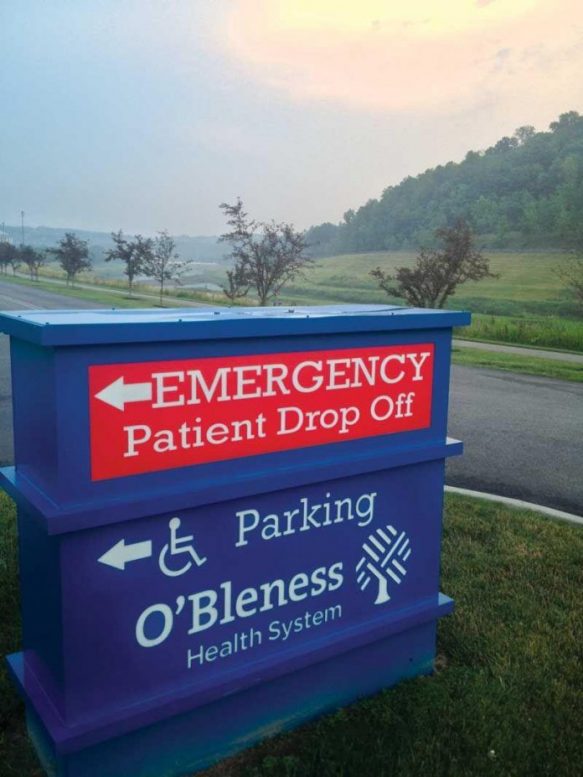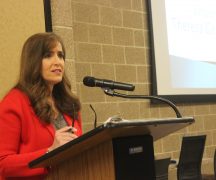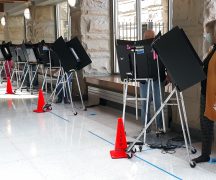Betty Chisholm, 94, died of COVID-19 just after midnight on Easter Sunday.
She was a resident of The Gardens of St. Francis, in Oregon, Ohio. Her son, Ken, a registered nurse, still has unanswered questions about how she died. If the facility was locked down, how did the virus get in and make it to his mom? She told him she was interacting with staff who weren’t wearing protective equipment; was the claim true?
The facility has had nine cumulative cases among residents and two among staff since April 15, per state records.
While trying to ferret out answers from management, Chisholm heard about legislation that would grant nursing homes and long-term care facilities, among other business, a powerful shield from lawsuits related to COVID-19.
The bills, Chisholm said in an interview, are moving things in the wrong direction as far as the elderly care centers go.
“What this [outbreak] has done is expose the industry’s dirty laundry and its true inability to care for the elderly and the vulnerable to the extent they need to be cared for,” he said. “There should be a sweeping investigation of the industry itself.”
He said he’s not sure if he wants to sue, though he has spoken with an attorney. But he came to Columbus to testify before the Senate Judiciary Committee on May 27 to oppose any effort to raise the bar for bringing a lawsuit.
Both the House and Senate have passed similar bills offering protections, known as qualified civil immunity, of varying degrees against lawsuits related to the new coronavirus. Both chambers need to reconcile the differences and approve a final product before it goes to Gov. Mike DeWine.
The bills have attracted a flurry of lobbying efforts from the industry, which says it would be unfair to hold it liable for the spread of a highly contagious, never-before-seen virus.
At least 1,641 residents of nursing homes and long-term care facilities have died of COVID-19 in Ohio, according to a count Wednesday from Cleveland.com. This amounts to about 70% of known deaths in the state from the disease. Nationally, nearly 32,000 nursing home residents have died from COVID-19, according to May 31 data from the Centers for Medicare and Medicaid Services.
Nursing homes have long struggled with infection control. The CDC says between 1 and 3 million serious infections occur annually in American long term care facilities. About 380,000 die of their infections.
The Cincinnati Enquirer reported in April that federal regulators have cited more than two in three of Ohio’s roughly 960 nursing homes for infection control violations over the last four years.
“There still needs to be some level of deterrent out there for nursing home operators to know they are being watched, and that they will, if it gets to the point of discovery, they will have to answer questions about their decisions and actions,” said Jason Smith, associate director of state advocacy for AARP.
The AARP, which represents 38 million retirees, has argued against any immunity, claiming it emboldens nursing home operators to cut corners given the decreased likelihood of tort action.
The Ohio Association for Justice, a group representing plaintiff’s lawyers, has argued against immunity as well, saying the bill removes accountability for unsafe actors, encourages unsafe behavior, and places those who undergo more thorough infection control efforts at a disadvantage.
The new coronavirus poses immense challenges to nursing homes, which host residents uniquely vulnerable to COVID-19. Industry representatives note chronic shortages of personal protective equipment and inability to provide blanket testing for residents.
“An N95 mask, not possible,” Scott Peters, operator of Randall Resident homes, told a legislative committee last month, of sourcing equipment. “To get a gown today is pretty difficult.”
The virus poses a threat to workers as well, Peters said, adding a staffing challenge.
“The most common answer when we ask our staff, what will happen if we have a positive case? They said, ‘See ya,’” he said. “That hasn’t happened as we worked through that.”
The Ohio Health Care Association, a group representing elder care centers, has supported both immunity bills from the get-go. Pete Van Runkle, its executive director, called any insinuation that immunity would lead to a lapse in care as “hogwash.”
He said care providers have every reason to strive to keep COVID-19 out of facilities — genuine care for patients, the bad press that comes with an outbreak, and regulatory compliance. Plus, facilities have had to provide care and develop best practices on the fly as guidelines change.
“The legislation allows injured parties to collect damages in the event of egregious conduct by a health care provider but protects against retrospective second-guessing of good-faith decisions by providers operating in extremely uncertain territory,” he said.
The bills say a residential care facility cannot generally be held liable for actions (or lack thereof) taken in a declared emergency.
Both pieces of legislation say the immunity is not available to those that act with “reckless disregard” or “willful or wanton misconduct.”
The bills have passed largely on party lines. Republicans have argued the bills offer needed protections in unprecedented times for a hard-hit industry. Democrats have said the bill sets too high a hurdle to hold a business accountable in court.
There are differences in the chambers’ proposals, some of which were added just before passage. For instance, the Senate version does not provide the immunity against wrongful death claims, which Van Runkle says shakes the association’s support.
“We are trying to figure out the lay of the land as far as a path forward,” he said. “But yes, the bill is less desirable as it stands today.”
It’s not just Ohio nursing homes pushing for immunity. Politico reports the industry has secured immunity protections in at least 20 states. The industry is making a push on Congress as well, with support from Senate President Mitch McConnell.
Along with nursing homes, the bills offer immunity to a spread of health care and general businesses that remain open during the pandemic.
In a statement, Christine Wasserman, a spokeswoman for The Gardens of St. Francis, did not answer questions about the death of Betty Chisholm. She said the facility has implemented numerous measures to combat the spread of COVID-19, like universal masking, monitoring symptoms, restricting visitors, and suspending group activity.
Whether from the facility, or the discovery phase of litigation when lawyers for both parties swap evidence, Ken Chisholm is still waiting for answers.
“I deserve to know how she contracted the virus,” he said.
Betty Chisholm, born in Toledo, worked at St. Charles Hospital Pharmacy and St. Paul’s Episcopal Church. She received her associate’s degree in business from Stautzenbarger College.
“There is no visitation due to the COVID19 pandemic and social distancing protocols,” her obituary states. “A Celebration of Betty’s wonderful life will be held at the appropriate time in the future.”
***
Also from Ohio Capital Journal:
Commentary: Antibody injections could fight COVID-19 infections – an infectious disease expert explains
Antibodies are part of us – literally.
We have billions of them in our bodies with a combined weight of about 100 grams, or about the weight of a bar of soap. If there are so many antibodies inside our bodies then they must be safe and very important, right?
Indeed, antibodies are perhaps the safest type of therapy and have many important functions. One of them is to protect and cure infections caused by viruses. The human immune system can produce antibodies specific for each type virus that bind strongly to the virus and block it from infecting our cells – so-called neutralizing antibodies.
I am an infectious disease scientist and am interested in antibody therapeutics because they are a relatively safe way to prevent severe disease and save lives, particularly when a new, deadly virus emerges. READ MORE





